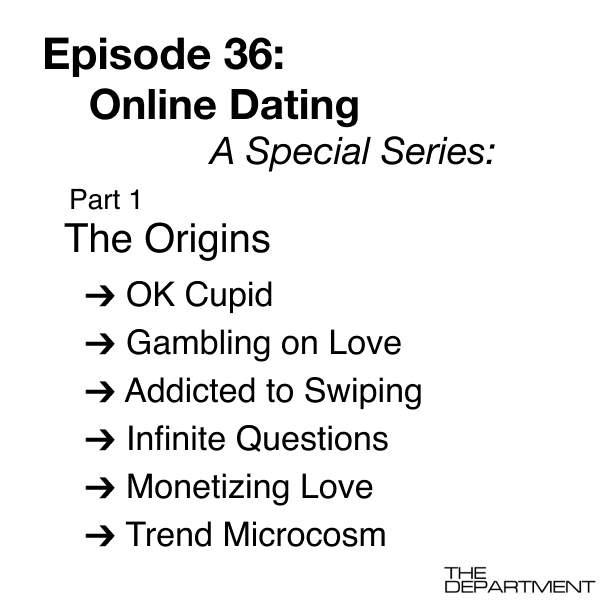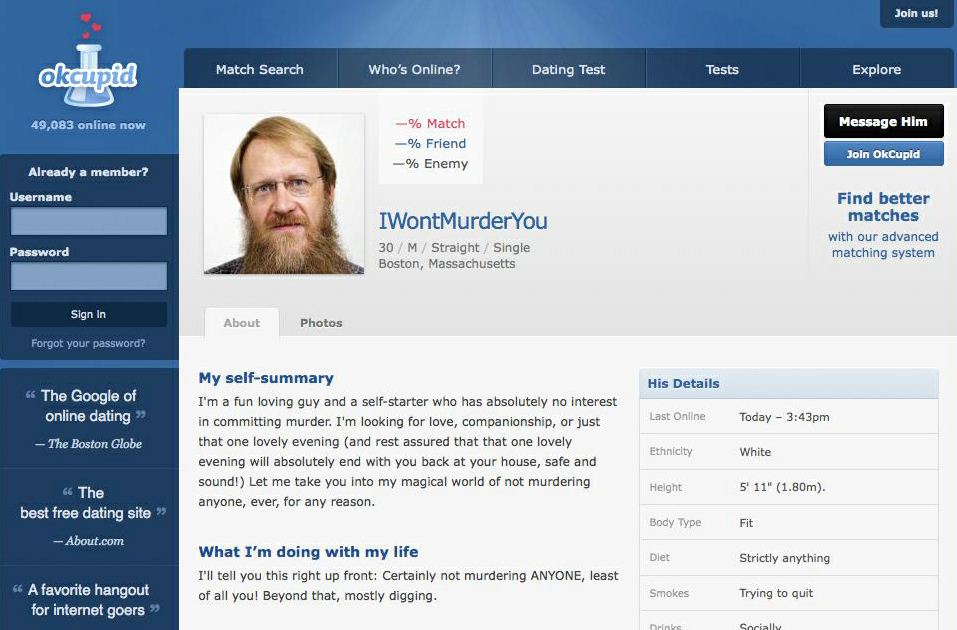︎︎︎episode 36
Online Dating Special (pt 1): The Origins, Sparknotes to OK Cupid, Data Mining, Trends & Trolls, Endless Questions, Video Dating Profiles, Addiction Swiping and the Paradox of Choice.
April 6th, 2021
︎︎︎︎ Listen on Apple
︎︎︎︎ Listen of Spotify
︎︎︎︎ Listen on Stitcher

Video Dating, Part 2 from Found Footage Festival on Vimeo.
Amanda: Today we are going to talk about the early years of online dating, specifically the granddaddy of them all, OKCupid.
I found a really dry 2020 Pew Research paper about online dating (be glad that I’m breaking it up for you all because it’s so boring), and here are the most interesting facts:
- 30% of U.S. adults have at some point used a dating app or website. That’s up from just 11% in 2013. So a marked increase! But still, 30% seems low to me!
- And just a reminder, these statistics are from the “before times.” I literally have no idea what’s going on with dating in this pandemic world and I’m not sure I want to know because it would probably give me anxiety.
- 12% said they found a long-term relationship via online dating, which kinda feels like a small number to me?
- Overall a majority of people said they had a positive experience, but when the survey drilled down into deeper questions, a lot of discouraging trends appeared:
- 37% of online dating users said someone on a site or app continued to contact them after they said they were not interested,
- 35% said they were sent an explicit message or image they didn’t ask for
- and 28% were called an offensive name.
- A smaller percentage (9%) said they were threatened with physical harm.
- Unsurprisingly, all of these numbers were SIGNIFICANTLY higher for women than men! In fact, these numbers jumped up substantially just for women:
- 48% of women using online dating said someone continued to contact them after they said no; 46% received unwanted explicit images; 33% were called offensive names; and 11% were threatened with physical harm.
- And younger women experienced to an even greater degree: 6 in 10 (that’s 60%) of women aged 18-34 said someone continued to contact them after they said no, 57% received unwanted explicit messages, 44% were called explicit names, and 19% were threatened with physical harm
- So basically, a majority of young women are not having a great time online dating.
- When all the people surveyed were asked if they felt that online dating had a negative impact on dating overall, about half said yes
- When current dating app users were asked how the platforms made them feel, more said they felt frustrated (45%) instead of hopeful, pessimistic (35%) instead of optimistic and insecure (25%) instead of confident. So, kinda depressing results.
- 71% of people said that they felt people on online platforms were “lying and scamming.”
- An article published in the December 2018 issue of The Atlantic concluded "Unless you are exceptionally good-looking, the thing online dating may be best at is sucking up large amounts of time."
- As of 2019, Tinder said it logged 1.6 billion swipes a day, and just 26 million matches. Just not a lot of matching for people because it was (and is) so looks based
- However, the same article--which btw I should just tell is you called Why Are Young People Having So Little Sex--also stated the ideas around dating/how to ask someone out/even the futility of asking someone out have shifted a lot in the 21st century
- “According to a November 2017 Economist/YouGov poll, 17 percent of Americans ages 18 to 29 now believe that a man inviting a woman out for a drink “always” or “usually” constitutes sexual harassment. (Among older groups, much smaller percentages believe this.)”
- Another study from the same year found that users of OKCupidpursued people who were “25% more desirable” than they were. Which is sort of depressing.
Right now, Tinder is the biggest app out there, raking in $1.4 billion in 2020, which was an 18% increase over 2019. In fact, Tinder says that the pandemic has actually INCREASED activity on the app.
- people updated their bios about 50% more than they did before the pandemic
- Conversations on average were 32% longer than they had been pre-pandemic
- People matched 42% more often!
- The number of swipes on Tinder broke 3 billion in a single day for the first time in March of 2020, and then proceeded to surpass that benchmark 130 more times since.
- Through the pandemic, profiles have reflected the various political and social trends of the past year: wearing masks, hoarding toilet paper, zoom meetings, Cardi B’s WAP, Carol Baskin, voting, vaccines, and even Black Lives Matter. In fact, bio mentions of BLM grew more than 5,000 percent last year, surpassing the perennially popular term “hook-up” by the end of the year.
- Tinder sets itself apart from the other apps (which btw, have also been killing it in the past year) by focusing on casual dating, sort of dating culture, not looking for a serious thing/settling down. There are other apps for that!
Some hardcore googling lead me to learn that the best apps for a “serious” relationship are:
- Coffee Meets Bagel
- Match
- The League
- Bumble
- Elite Singles
- Once
- OK Cupid
Now we are going to be talking about OK Cupid today, but first I just wanted to state a few other things I have learned via the internet, episodes of Catfish, and general conversation:
- Plenty of Fish is the best platform if you want to be catfished. I don’t think that’s where the name came from, but I’ve noticed that it comes up a lot on Catfish and on 90 Day Fiance.
- eHarmony is where you go if you’re looking to get married: 71% of women, 69% of men meet their spouse on eharmony within a year, which is terrifying to me.
- Eharmony’s success is based on exhaustive personality assessment that you must take upon signing up and you can be rejected, especially if you aren’t religious, don’t believe in traditional gender roles, and are generally liberal in any sense.
- A friend of mine heard about this, we took the test, and we were immediately rejected.

So online dating has without a doubt changed dating forever, it’s made it easier in a lot of ways to meet people outside your social circle, and it’s pretty low commitment/low cost. How did people meet back in the 80s and 90s?
- Social groups and clubs
- Church
- School, work, blind dates set up by mutual friends and relatives
- Matchmakers
- Personal ads in the newspaper: this was revolutionized by the improvements of phone technology where someone could call a special number, type in the code for your ad and leave a message/hear your outgoing message. Later these newspaper personal ads--a key part of free weeklys for years--moved online, often run by Nerve.com and their dating site. Side note: we sold like 9 gazillion of those Nerve sex position books in the aughts at Urban Outfitters.
- Missed connections, “I Saw You”
- Video Dating in the 80s and 90s. I found an article that explained this phenomenon a it:
- “Before there were dating sites, there were dating services. What many of them did was have the members record a video introducing themselves. [...] In order to view the videos people would go into the service's building. The staff would typically give people a bunch of videos to look at that they had pre-screened for common interests, much like dating sites do now but it was done by people rather than computers."
- Some of these video dating services had real life “mixers” for the singles
- This amazing 1987 video dating comp: https://vimeo.com/105904720
- Some hot quotes: "Hi, I'm Maurice. I'm an executive by day and a wild man by night."
- "I'm looking for the goddess. Are you the goddess? Who's the goddess? A goddess is a woman, the woman, it's all women."
- "No hamsters."
- "I'm currently involved in cleaning up toxic waste."
- "I've decided that I'm lonely."
- “A co-ed bubble bath is something I've always wanted to try out."
- "I seek a person that is childlike."
In 2004, OKCupid burst on to the scene. OkCupid's founders (Chris Coyne, Christian Rudder, Sam Yagan, and Max Krohn) were students at Harvard University when they created The Spark and Spark Notes. Spark Notes were basically (then) a free version of Cliff Notes.
- TheSpark.com featured a lot of quizzes that seem to be more “real” than those Buzzfeed quizzes, including the four-variable Myers-Briggs style Match Test.
- SparkMatch debuted as a beta experiment of allowing registered users who had taken the Match Test to search for and contact each other based on their Match Test types.
- In 2001, SparkMatch really took off and was rebranded as OKCupid. SparkNotes was sold to Barnes and Noble the same year.
- I definitely had no awareness of OkCupid until around 2006, when I was visiting Portland, OR and my best friend signed up for it.
- Creating a profile took some work. The questions were like:
- What I'm doing with my life"
- "I'm really good at"
- "The first thing people notice about me"
- "Favorite books, movies, shows, music, and food"
- "The six things I could never do without"
- "I spend a lot of time thinking about"
- "On a typical Friday night I am"
- Initially it combined the cruelty and shallowness of Hot or Not with a wide array of personality questions that would help “improve” your matches
- You would rate a person on their looks and then separately on their personality (based on their profile), and it was kind of addictive
- Somewhere along the way OKCupid dropped the separate ratings, just having you give one overall rating--getting a little bit closer to the swipe left/right of Tinder
- But OKCupid really, really wanted to find you a true match with its algorithm
- There are more than 600 of these personality questions
- 28 Are you either vegetarian or vegan?
- 615 How much can intelligence turn you on?
- 600 Have you smoked a cigarette in the last 6 months?
- 590 Do you believe contraception is morally wrong?
- 582 How willing are you to meet someone from OkCupid in person?
- 573 How important is religion/God in your life?
- 565 Do you like to cuddle?
- 565 Are you a cat person or a dog person?
- 564 How often do you brush your teeth?
- Ostensibly your answers--combined with individual rating, will lead you to matches, with a % compatibility rating...and I don’t know if they do this any more, but in the early days you would also get a “%enemy” score for each person
- A man in LA famously gamed the algorithm using all kinds of bots and code to harvest data and impersonate users, he ultimately found his wife
- OkCupid was harvesting SO MUCH DATA from users, that for years they had an OKTrends blog that broke down the personalities and interests of its users, painting really interesting and accurate portraits of millennials.
Now here’s the real twist of this whole episode:
In 2011, OKCupid was acquired by Match Group, who owns SO MANY DATING SITES that you probably think are super different:
- Match.com
- Tinder
- Hinge
- Black People Meet
- Our Time (for older singles)
- Plenty of Fish
- Ship
In total, 22 different dating apps!!
